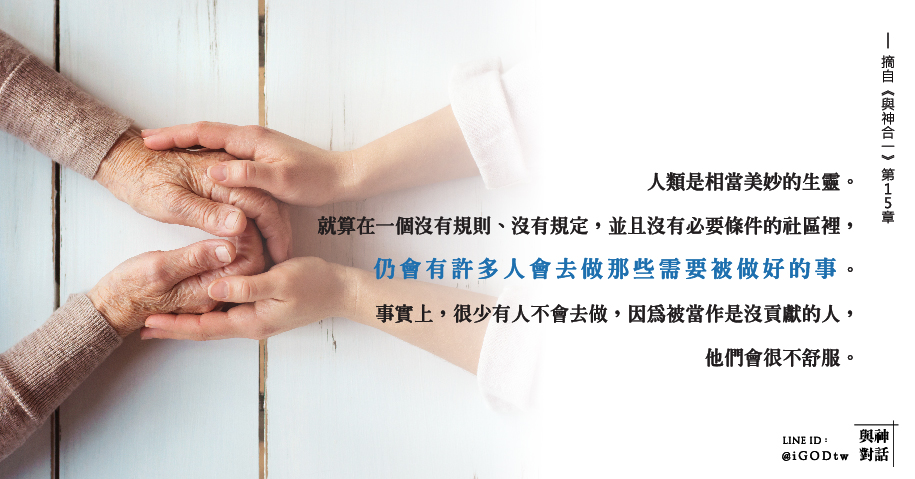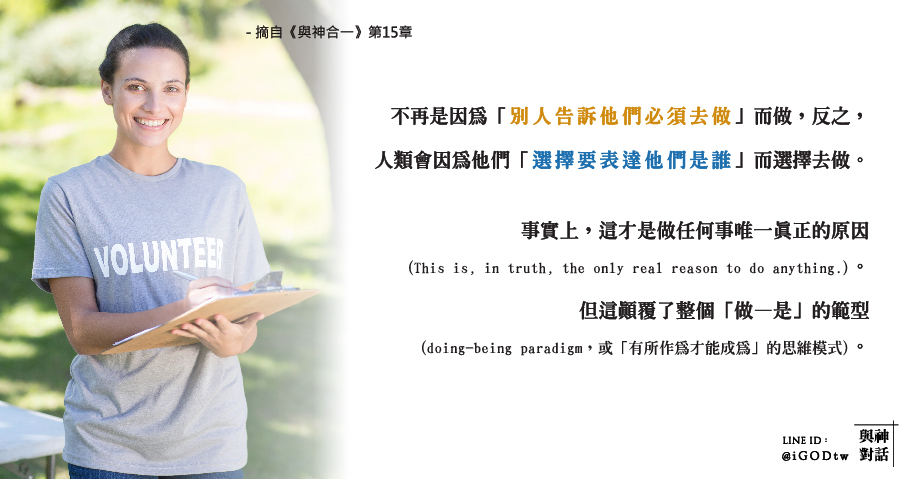
聽神談【加速人類邁入「文明社會」的新觀念】
人們認為,如果不去管那些沒人想做的事的話,就不會有人去做那些「要使生活可以繼續下去就必須有人去做好」的事了。
那種擔心害怕是杞人憂天的。你們會發現,人類是相當美妙的生靈。就算在一個沒有規則、沒有規定,並且沒有必要條件的社區裡,仍會有許多人會去做那些需要被做好的事。事實上,很少有人不會去做,因為被當作是沒貢獻的人,他們會很不舒服。
那就是如果沒有規則、規定或必要條件時,會發生的改變。會改變的不是「哪些被做好」,而是「為什麼會被做好」的理由。
「為何而做的理由」會被改變。

不再是因為「別人告訴他們必須去做」而做,反之,人類會因為他們「選擇要表達他們是誰」而選擇去做。
事實上,這才是做任何事唯一真正的原因(This is, in truth, the only real reason to do anything.)。但這顛覆了整個「做—是」的範型(doing-being paradigm,或「有所作為才能成為」的思維模式)。人類一直以來所建構的範型模式是,一個人要去做某事,然後他才會是某狀態。在這新的範型下,一個人「是」某狀態,然後他去「做」某事。
一個人是快樂的,然後他就做「一個快樂的人會去做」的事。一個人是負責的,然後這個人就會做「一個負責的人會去做」的事。一個人是仁慈的,然後這個人就做出「一個仁慈的人會去做」的事。
一個人並不是「去做負責任的事」就可以是負責任的人。一個人並不是「去做些有慈悲心的事」就會是個慈悲的人。這只會導致怨恨(「我都已經做這麼多了!」),因為那假定了所有的「做」都會得到報酬。
摘自《與神合一》第15章
Humans believe that, left to their own devices, people would not do what needs to be done to keep life going.
That fear is unfounded. Humans, it would be discovered, are pretty wonderful beings. And in a community where there were no rules, no regulations, and no requirements, there would still be plenty of people who would do the things that need to be done. In fact, there would be very few who would not, for they would be uncomfortable being known as non-contributors.
And that is what would change if there were no rules, regulations, or requirements. What would change is not what is being done, but why it is being done.
The “why” of doing would be altered.
Instead of doing things because they are told they must, humans would do what they do because they choose to, as an expression of Who They Are.
This is, in truth, the only real reason to do anything. But it reverses the entire doing-being paradigm. The way humans have constructed the paradigm, one does something, and then one is something. Under the new paradigm, one is something, and then one does something.
One is happy, and then one does what a happy person does. One is responsible, and then one does what a responsible person does. One is kind, and then one does what a kind person does.
One does not do responsible things in order to be responsible. One does not do kind things in order to be kind. This only leads to resentment (“After all I’ve done!”), because it assumes that all the doing will be rewarded.

